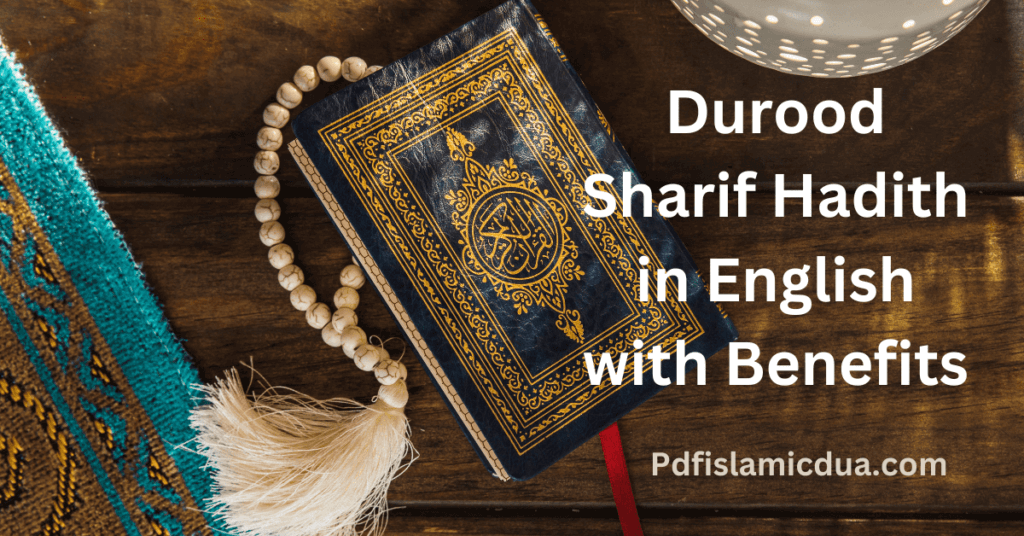Blog
100 baar durood sharif, a short durood from the hadith, benefits of durood sharif, darood english, darood sharif, darood sharif ki fazilat, durood, durood e ibrahim in english, durood e ibrahimi english, durood shareef, durood sharif, durood sharif 100, durood sharif lecture, noreen mohammad durood sharif, short durood sharif, small darood sharif in arabic, small darood sharif in english, small darood sharif in hindi
pdfislamicdua
0 Comments
Durood Sharif Hadith in English with Benefits
Durood Sharif is vital in all acts of worship (Ibadah), especially during Rabiul Awwal, when reciting it brings immense rewards. Our Prophet Muhammad (SAW) is the final messenger of Allah, sent with the Holy Quran for the guidance of the Ummah, and his arrival was the reason for creation.
We can follow his Sunnah and apply his teachings to express our love for the Prophet (SAW). One of the most significant ways to do this is by knowing Durood Sharif Hadith

A hadith states,
“The closest person to me on the Day of Judgment is the one who sends the most blessings upon me” (Sunan al-Tirmidhī 484). This highlights the importance of sending blessings as a means to earn Allah’s favor and draw closer to the Prophet.
Durood Sharif is a special Dua in which we send blessings upon the Prophet Muhammad (SAWS). The most recognized version is:
اللَّهُمَّ صَلِّ عَلَى مُحَمَّدٍ وَعَلَى آلِ مُحَمَّدٍ كَمَا صَلَّيْتَ عَلَى إِبْرَاهِيمَ وَعَلَى آلِ إِبْرَاهِيمَ، إِنَّكَ حَمِيدٌ مَجِيدٌ
Transliteration:
ALLAHUMMA SALLI ‘ALA MUHAMMADIW WA ALA AALI MUHAMMADIN KAMAA SALLAITA ALA IBRAHIMA WA ALA AALI IBRAHIMA INNAKA HAMIDUM MAJEED.
Durood Sharif Hadith
Durood Sharif is supported by various hadiths, including:
- Sahih Bukhari (Vol #4, Hadith #3370): Narrated by Abdur-Rahman bin Abi Laila, Ka’b bin Ujrah received guidance from the Prophet Muhammad (SAWS) on how to send blessings upon him.
- Sunan Nasa’i (Vol #2, Hadith #1289): Ka’b bin Ujrah taught the companions the proper way to send Durood upon the Prophet (SAWS).
- Sunan Nasa’i (Vol #2, Hadith #1291): Another narration confirming this teaching.
Importance of Durood Shareef
The significance of Durood Sharif is emphasized through various hadiths:
- Abdullah bin Mas’ud narrated that the Prophet (SAWS) said, “The person closest to me on the Day of Judgment is the one who sent the most Salat upon me” (Sunan al-Tirmidhī 484).
- ‘Abdullah bin ‘Amr bin Al-‘As reported that the Prophet (SAWS) said, “Whoever supplicates Allah to exalt my mention, Allah will exalt his mention ten times” (Muslim).
Durood Sharif on Friday
The Prophet (SAWS) highlighted that Friday is one of the most excellent days, and sending blessings upon him on this day holds great virtue (Sunan Abi Dawud 1047).
Benefits of Durood Sharif
Reciting Durood Sharif offers numerous benefits, including:
- For every recitation, Allah sends 10 blessings, forgives 10 sins, and raises one’s status by 10 degrees.
- It draws one closer to Allah and His Prophet, bringing peace and blessings into life.
- It serves as a means of forgiveness, a source of mercy, and helps in the acceptance of duas.
- Reciting Durood eases hardships, removes troubles, and alleviates poverty and hunger.
- Regular recitation purifies the heart and strengthens one’s spiritual connection with Allah.
- The person who recites the most Durood will be closest to the Prophet Muhammad (SAWS) on the Day of Judgment.
- Durood Sharif enhances memory and helps remember things when they are forgotten.
- It increases good deeds.
Frequently Asked Questions
1. What is the importance of Durood Shareef in the Quran?
Durood Sharif strengthens the faith of Muslims, who pray for the success of the Messenger of Allah (SAWS) in both worlds.
2. What to recite after Durood Shareef in prayer (namaz)?
After Durood Ibrahim, you can read any Quranic dua, such as:
Rabbij’alnee muqeemas salaati wa mindhur-riy yatee — “O Lord, make me and my children keep up prayers.”
3. Can you recite Durood Sharif during menstruation?
Yes, reciting Durood during menstruation while performing other forms of Dhikr is permissible.
4. Can I read Durood without Wudu?
Yes, it is permissible to recite Durood without Wudu, though maintaining Wudu is recommended during Dhikr.
5. Is Durood Ibrahim the same as Durood Sharif?
Yes, Durood Ibrahim is a form of Durood Sharif and is considered the most authentic and prominent.














Post Comment